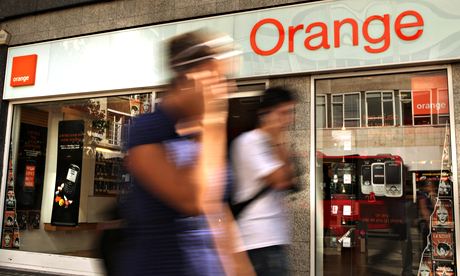
The future is bright but it may not be Orange for much longer in the UK. One of the world's most successful brands after it was created on these shores 20 years ago, the mobile phone network is to phase out its distinctive presence in Britain.
Orange has stopped signing new customers online in the UK and, along with sister company T-Mobile, it has closed its British internet shopfront.
The move is being seen as the first big step in parent company EE's gradual winding down of two of the best known names in British telecoms, as it seeks to move customers on to its new superfast 4G network.
"This is a clear signal of intent that over time the Orange and T-Mobile brands will be phased out," said mobile expert James Barford at Enders Analysis. "Online is not the biggest channel but it is a very significant channel."
Launched in 1994 as the fourth operator in an already crowded market, Orange quickly distinguished itself from rivals. With mobiles still seen as flashy gadgets for bankers, the company marketed its service as simple to use and accessible to all.
Conceived by an in-house team led by founder Hans Snook and marketing director Chris Moss, the name was unusual for the technology scene in the 1990s.
The consultancy Wolff Olins, which was employed by Orange to define its corporate identity, explained the concept: "We gave the network the name of a colour, not a technospeak name like Vodafone or Cellnet."
The advertising agency WCRS came up with a catchy slogan – "The future's bright, the future's Orange" – and by the time Orange was bought by France Telecom in 2000 it was valued at £25bn.
Millions were lavished on high profile sponsorships, with Orange backing the Baftas and the Orange prize for fiction. Last year Orange was elbowed aside as title sponsor of the Baftas, which are now known as the EE British Academy film awards, while the women's prize for fiction is now backed by drinks brand Baileys. Even Wednesdays are no longer exclusively Orange's. EE customers can also get two cinema tickets for the price of one.
However, Orange is not disappearing entirely. The identity which Snook and his team created remains potent, so much so that France Telecom, the former state-owned network, decided to rebrand. As of last year the entire business, from fixed line to mobile, in France and abroad, is now called Orange.
But the merger in 2010 of the UK operations of Orange and T-Mobile, which is owned by Deutsche Telekom, created the conditions that could now lead to the name disappearing from the UK.
The lack of a dominant owner – the French and Germans each have a 50% share of the holding company – led to squabbles. When the time came to invest billions in a brand new 4G network, there was a branding dilemma.
T-Mobile's success was largely based on presenting itself as a budget brand, whereas Orange was seen as a hallmark of quality for which subscribers were prepared to pay more. But Deutsche didn't want to cede value to its French partner.
The compromise was the launch of a new network, EE, in October 2012. Its name is now the only one above the door on the group's 600 high street shopfronts.
As of this month, customers looking for Orange and T-Mobile's websites have been redirected to EE's, which displays the following message:
"Orange and T-Mobile plans and phones are still available to buy, just not through our online shops any more. If you'd like to join Orange or T-Mobile, you can still pop into an EE store, ring our EE sales team or check out our official eBay shop for the latest offers."
A spokeswoman said: "We've done this to better reflect our high street retail strategy, giving a consistent experience across all of our brands." Asked whether Orange and T-Mobile would stop signing any new customers later this year, she said: "We continually review our brand and retail strategy, and currently have no plans to change our approach. We're confident that the EE, Orange and T-Mobile plans offer our customers the best value and choice across a variety of price points."
EE's higher prices and the removal of a layer of management have increased underlying earnings at the group from around 22% to 25% of revenues.
"EE has been pushing into the heartland of Orange's mid-tier pricing by reducing the premium charged for 4G," said analyst Kester Mann at CCS Insight.
Mann estimates EE has 3m customers, while its sister companies share 21.5m, down from 26m at the end of 2012. The company does not publish separate figures for Orange and T-Mobile.

